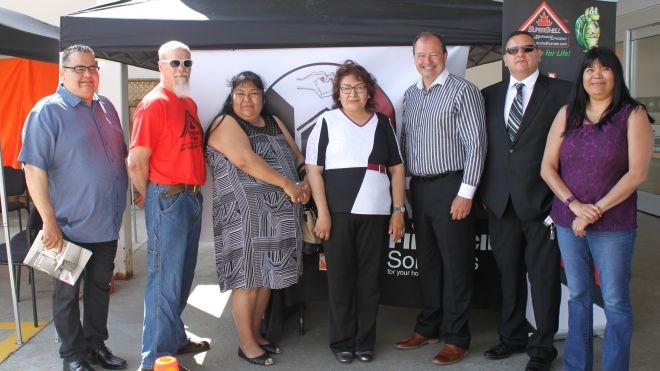A North Bay company is participating in a new partnership that will provide community members in Whapmagoostui First Nation with energy-efficient homes, reducing their reliance on diesel and supporting their traditional lifestyle.
SuperSHELL Homes of North Bay has been contracted to build two of its ultra-energy-efficient homes on the remote First Nation, located on the coast of Hudson Bay in northern Québec, as part of a pilot project called Helping Homes, or Washkahagun Wechihitowin in Cree.
Whapmagoostui Chief Louisa Wynne said the community is currently facing a backlog of 90 new homes. In many cases, residents are living in overcrowded conditions, which leads to social problems throughout the community.
The pilot project is designed as an affordable solution for lower-income community members who still want to practise their traditional lifestyle.
“About 35 per cent of the community still goes out on the land to hunt,” Wynne said during the July 19 project launch in North Bay.
“It’s the traditional way of life, and these are the people that we’re targetting for this pilot project.”
Hunters and trappers in the community can be out on the land for up to seven months of the year, earning less than $35,000 in income annually, she noted. It’s difficult for them to support two lifestyles — one that allows them to follow traditional customs and another that requires them to pay rent and maintenance costs on a home.
An economical, energy-efficient house that’s cheaper to heat alleviates some of that burden, Wynne said.
“Our goal is to find ways for our people to afford energy-efficient housing, which would be a socioeconomic resolution for our people that are living in those situations,” she said.
Representatives of Whapmagoostui and SuperSHELL first met in June, and from there the Helping Homes project was created.
If the pilot project is a success, Wynne said the community would look at building more SuperSHELL homes next year.
The key factor that makes the homes so efficient is insulation, and plenty of it.
Ross MacLean, who co-owns the company with his business partner Glen Chiblow, said a SuperSHELL home uses three times the amount of insulation of a traditionally built home, significantly improving the insulation ratings throughout the structure.
“SuperSHELL wanted to use standard building processes, because we didn't want it to be hard to build,” MacLean said. “So we designed all our projects to be easily implemented: carpenter-friendly, code-friendly — that was our first goal.”
To ensure the performance and longevity of a home, the company developed the “SuperSTUD,” a stud that is stronger, thicker and has more insulation holding capacity than traditional building studs. It additionally incorporates a “thermal break,” which reduces heat loss and makes the installation of plumbing and electrical systems much easier and more efficient.
SuperSHELL’s approach to building is catching on. The company has built homes in Garden River First Nation near Sault Ste. Marie, Marten Falls First Nation north of Thunder Bay, and Saugeen First Nation near Owen Sound.
MacLean noted that, for the eightplex project at Saugeen, SuperSHELL was recognized for having built the most multi-unit home in Canada. SuperSHELL was recognized last January by the provincial Ministry of Energy for its efforts.
For many First Nations, their current stock of housing is substandard, or is inadequate to meet demand. SuperSHELL homes offer them a quality, affordable and long-lasting solution.
As part of the Whapmagoostui pilot project, SuperSHELL will be building a raised bungalow with a basement, and a one-and-a-half-storey, 1,400-square-foot, three-bedroom home. MacLean estimates the homes will have a value of R28 in the foundations, R66 in the walls, and R80 in the ceilings.
“With diesel dependency, the payoff will be immediate, and for the lifetime of the structure,” he said, noting there may also be opportunities to add solar or wind energy-generation technology to the homes to further increase their efficiency, bringing them closer to Net Zero Ready homes.
As an added benefit, Whapmagoostui community members will get an opportunity to train in some of the skilled trades alongside MacLean and his crew over the 14-week build.
“The idea is to develop some of those other skill sets, like learning to drywall,” MacLean said. “So in your off time from trapping, you can bid on some of the contracts with whatever your aptitude is.”
Though the benefits of the SuperSHELL build are indisputable, it won’t be cheap.
It’s expected to cost around $500,000 — or $246,000 per home — just to complete the pilot project, and Whapmagoostui is seeking the help of corporate sponsors to offset some of the costs of the build.
Roxul, a Milton-based manufacturer of stone wool insulation, has already agreed to provide the insulation for the project — an estimated one third of the cost. Ideally, the community would also like to have a truss manufacturer involved to provide roof trusses. Tax receipts can be issued for donations, as Helping Homes does have charitable status.
A crowdfunding campaign has also been launched to help raise funds for new appliances and furniture to outfit the homes once they’re complete.
MacLean expects to get up to the community to start site assessment some time in August, and construction is slated to start on Sept. 1.
Robert Wynne, Whapmagoostui’s director of operations, believes this pilot project will serve as an example to other communities who are searching to find their own solutions to inadequate Indigenous housing.
“I hope that in the future we will see more of these projects happening with the First Nations, because all across Canada there is a housing crisis on First Nations,” he said.




